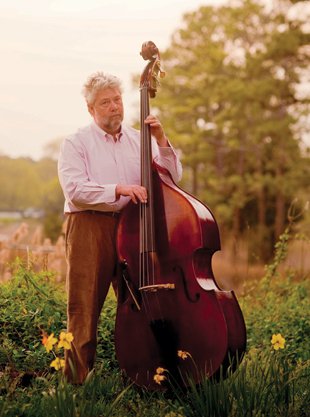When not hanging with friends, William “Pooh” Johnston can be found playing viola or blues guitar, composing soundtracks, cooking and raising oysters near his historic Eastern Shore home.

On an early winter afternoon, William “Pooh” Johnston hosts a few friends at his venerable Eastern Shore home at Only Farm in Onancock. We sip rye whiskey old-fashioneds while the fire flickers on the high brick hearth in Johnston’s half-basement kitchen. The host is making paella, slicing squid and stake fish. Basements, even half-basements, aren’t traditional out here because of the lowness of the land; this one was built by governor Henry A. Wise (who sat from 1856-1860) for his first wife, Philadelphia native Anne Jennings. “It’s like it was lifted from the streets of colonial Philadelphia,” Johnston says, pouring stock into the bubbling pan. Though Johnston holds a grande diplome from Le Cordon Bleu school in Paris, where he studied under Elisabeth Brassart (as did Julia Child), he admits to never having actually tasted paella. “So this is only my idea of what paella is,” Johnston laughs.
Why not cook full-time? “Life’s too short,” he says. At age 52, Johnston is also a versatile musician—moving easily between playing Bartók on viola for the Orchestra of the Eastern Shore and wielding his red Fender Telecaster alongside Shore soul and bluesman Burley Strand—and composer, having produced and performed scores for films and art installations, notably the electronic Korean rap opera Seoul House. He teaches guitar (and cooking) locally and travels frequently. Here at home, most weekdays, he’s out on the bay farming oysters. Set-aside family money keeps Johnston from the yoke of full-time employment, but he stays busy and enjoys his eclectic jobs. After a good night with Strand, he quips, “I don’t write checks.”
The fourth William Allan Johnston, born in Winchester, was educated at the University of Virginia. Only Farm has been in his family since 1947, mostly as a vacation house—hunting, fishing and partying—until 1987, when Johnston returned from Parisian studies and moved in. He didn’t intend to stay, but more than 20 years and many renovations later, he’s still here. With help from his younger brother, Richie, Johnston built an addition to the Wise house—an enormous living room with a Rumford fireplace and window-walls on three sides, overlooking Poplar Cove. “Richie did most of the building,” Johnston explains. “If something started to look fishy, we’d take the afternoon off and go fishing.” One sees in the living room a harpsichord, a piano, a Whirlwind pinball machine, a restored vintage Gibson parlor guitar with liquid gold tone, and several couches and chairs surrounding the fire—a perfect place to retire post-paella.
For 20 years, Johnston has been collaborating with Y. David Chung, a German-born Korean friend from college. Chung was the writer and other composer of Seoul House, which in the late 1980s used a blend of electronic sequencing and a dadaist-cum-vaudeville narrative style to tell the story of a Korean family that owns a market in a turbulent D.C. neighborhood. After that, Johnston worked on two more live-event soundtracks with Chung and another installation/video artist, Matt Dibble—one performed at the Whitney Museum in New York City (1992) and the other at the Corcoran Museum in D.C. (1994). In 1998, the three traveled to Kazakhstan to create and perform a play titled The Wishing Tree. “We got local musicians to add native instruments to the electronically sequenced work,” says Johnston. A second trip to Kazakhstan, on a grant to collect native Kazakh and Uighur music, exposed the three artists to a Korean community made up of descendants of Stalin-era deportees. With Johnston composing and playing much of the music, Chung and Dibble co-directed the documentary Koryo Sayam, which tells their story. It won “best documentary” from the National Film Board of Canada in 2007.
Chung, now a professor at the University of Michigan, describes Johnston as “very multidimensional, which is key for the work we’re doing. He has an appetite for life.”
Sitting in front of the Rumford fireplace and sipping Powers Irish whiskey, Johnston contemplates the future. He expects to be working with Chung soon—“It could be tomorrow,” he says, swirling his drink, “it could be in five months.” Meantime, he’ll soon be off to France to visit with his adult son and enjoy varied gastronomic experiences in the city’s arrondissements.









